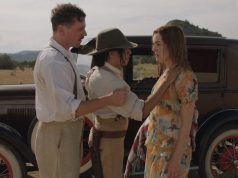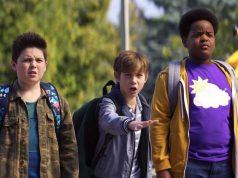The phrase “quiet and contemplative” is not often used to describe bank-heist movies, but “The Lookout” is not an ordinary bank-heist movie. In fact, its misleading advertisements to the contrary, it’s not really a bank-heist movie at all. It’s a character study, and a rich, rewarding one at that. And yeah, OK, there’s a bank heist, too. But the movie is not ABOUT the bank heist! If you go in looking for an “Ocean’s Eleven”-style crime caper, you will be bored and disappointed, and that is not the effect “The Lookout” should have on you.
The place is Kansas City, the time is now. Four years ago, Chris Pratt (Joseph Gordon-Levitt), a talented high school hockey player, was in a car accident with three friends. Two of them were killed. Chris came out of it with some brain damage. He can walk and talk and function more or less normally, but he has episodes of forgetfulness, or he’ll get mental blocks: “I call tomatoes ‘lemons,’ even though I know that’s wrong.” He carries a card with him to let people know that he suffered a massive head injury and might, therefore, occasionally say inappropriate things, or begin crying for no reason, or forget where he parked his car.
Chris lives with a blind man named Lewis (Jeff Daniels), also an accident victim, and goes to therapy to help him with his mental acuity. He’s learning to get by on a system of “ritual, pattern, and repetition.” If you always do things the same way, then it won’t matter if you have occasional memory lapses because your subconscious will know what to do. His life is a series of habits, and that’s how he’s able to work 90 minutes away at a small-town bank, where he’s the night janitor. He wants to be a teller someday. The bank manager (David Huband) keeps saying he’ll think about it. He’s a kind man, but he’s cautious. Chris’ injuries have made him slightly unpredictable.
The bank manager isn’t the only one who is uncertain how to deal with Chris. Deputy Ted (Sergio Di Zio), the aw-shucks Midwestern cop who stops by each night to bring Chris doughnuts and chat for a few minutes, treats him as though he were mentally retarded. Chris’ wealthy parents (Bruce McGill and Alberta Watson) help him financially and love him as much as ever, yet they remain cautious around him. Dad still wants to play chess with him, unable to accept that Chris’ brain can’t handle the complexities of the game well enough to be a decent player. It’s a little heartbreaking.
Chris has been urged by his case worker (Carla Gugino) to try to meet women and develop more of a social life. He’s in a bar one night, trying to do just that, when he runs into Gary Spargo (Matthew Goode). Gary says he dated Chris’ older sister a few times and was a couple years ahead of him in school. Chris doesn’t remember, but that’s OK; Chris doesn’t remember a lot of things. Gary invites Chris to hang out with his crowd, a bunch of layabouts and slackers who associate with loose women and drink a lot of beer. One of the women, Luvlee (Isla Fisher), takes a particular liking to Chris.
After several days of Chris’ new friendship with Gary’s group, Gary lets him in on a secret: They’re going to rob Chris’ bank, and they want Chris to help. He says no, of course, but then Gary makes some good points. The bank doesn’t take Chris seriously. Chris has very little financial freedom himself, with his low-paying job and his small allowance from his parents. Whoever has money has power, Gary says. Chris was influential and popular before the accident; now he’s a nobody, pitied or avoided by most people. If he had money, he’d have power again.
That’s where the bank heist comes in, but trust me, the details of it aren’t the point. This is a film about choices and consequences, about dealing with the past while looking ahead to the future, and at the heart of it is an outstanding performance by Joseph Gordon-Levitt. Who knew the kid from “3rd Rock from the Sun,” now 26 years old, would turn out to be one of the best actors of his generation? “The Lookout” rests entirely on his ability to make us sympathize with Chris without pitying him, to make us like him even though that fatal car accident was the result of his own recklessness. Gordon-Levitt commands sympathy, affection, and understanding, perfectly executing the role without resorting to maudlin or sentimental tactics.
It’s the directorial debut from Scott Frank, a talented screenwriter who has penned such noteworthy titles as “Get Shorty,” “Minority Report,” and “Out of Sight” (for which he was Oscar-nominated). Those were all adaptations; “The Lookout” proves he can write marvelous material from scratch, too, and his smooth, confident direction suggests he was paying attention when his previous screenplays were directed by experts like Spielberg and Soderbergh.
“The Lookout” has many quiet moments, giving us space to think about what’s been said, and to realize that the screenplay has been carefully constructed so that nothing is irrelevant. There are no throwaway scenes or extraneous characters. Everything is part of the whole, contributing to the poignant melancholy and yearning that characterize the film. The more I think about it, the more I’m touched by it.
A- (1 hr., 38 min.; )





